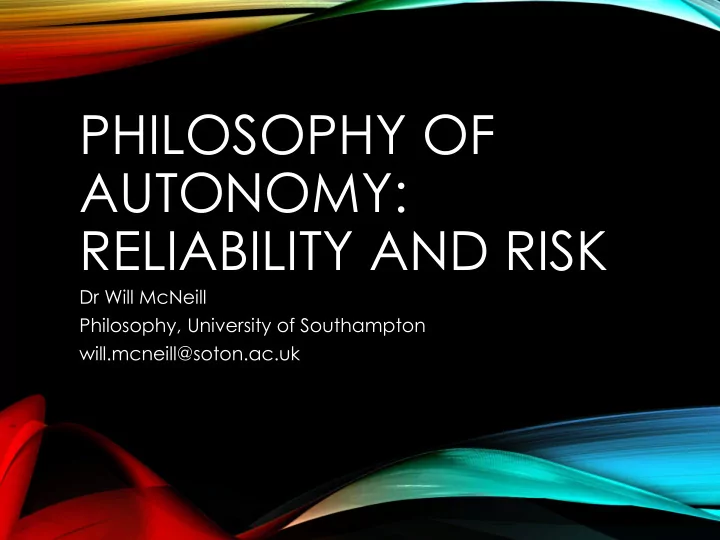

PHILOSOPHY OF AUTONOMY: RELIABILITY AND RISK Dr Will McNeill Philosophy, University of Southampton will.mcneill@soton.ac.uk
THE “PARADOX OF AUTOMATION” Automation decreases human’s skills … • … to deal with unexpected, novel situations • … to understand, effectively interact with, or take over from, autonomous systems in those situations where they no longer function effectively
THE “PARADOX OF AUTOMATION” THE RESULT a) Decreased risk in expected, standard situations BUT b) the possibility of greater risk in unexpected or novel situations c) A tendency toward ever more complex autonomous systems
RESOLVING THE PARADOX The Problem Classical Computers are good at the drudgery Potentially, humans can be skilled, creative and adaptable experts The Solution Design computer systems that are skilled, creative and adaptable
ARTIFICIAL NEURAL NETWORKS Good at coping with Signal noise Novel Stimuli High-level pattern recognition Problem-solving Artificial Neural Nets: Can react benignly to • unexpected and novel situations Solve “unfeasible” problems • Work over limited data • Display graceful degredation •
ARTIFICIAL NEURAL NETWORKS Artificial Neural Networks are taking us to the next level of automation Given the nature of the problem this is precisely what we would expect HOWEVER ….
NEW QUESTIONS Artificial Neural Networks are computational “black boxes” ? INPUTS OUTPUTS They are not explicitly programmed. - They are trained or evolved. Their processes involve no explicit representations. - Our models of their processing are limited.
NEW QUESTIONS Artificial Neural Networks are computational “black boxes” P2 The “paradox of autonomous risk” P3 The “paradox of autonomous testimony”
P2: TWO QUESTIONS ABOUT AUTONOMOUS RISK P2.1 descriptive problem To be widely adopted, ANN autonomous systems need to be perceived to be safe. P2.2 normative problem In order to be widely rolled out, designers need to be able to justify the safety ANN autonomous systems
P2.1 Descriptive problem of autonomous risk • There are individual, cultural, question-specific and context-specific perceptions of risk. • These do not neatly mirror actual risk FOR EXAMPLE: We tend to be less sensitive to • voluntary than to involuntary risk We tend to be less sensitive to • familiar than to unfamiliar risk
P2.2 STANDARD “CLASSICAL” SYSTEM RELIABILITY RULES OF THE SYSTEM JUSTIFICATION OF ACCEPTABLE RISK
P2.2 NEURAL NETWORK SYSTEM RELIABILITY RULES OF THE SYSTEM JUSTIFICATION OF ACCEPTABLE RISK
P2.2 In a standard system our understanding of the system’s processes allows us to explain its output In a neural network system we can rely only on its historic reliability. • The system’s processes do not allow us to explain its output. It is not clear what justifies our expectation that the system will continue to be reliable. • Analogy: white swans
P3: THE PROBLEM OF AUTONOMOUS TESTIMONY TESTIMONY You believe that P because S tells you that P • You believe that P on the basis of testimony QUESTION How is it possible to secure knowledge that P by testimony? - Default entitlement to accept others’ assertions - Ability to trust in or discern S’s authority with respect to P
P3: THE PROBLEM OF AUTONOMOUS TESTIMONY You believe that P because the computer outputs that P • You treat the computer as reliable with respect to P • You understand the mechanism by which P was delivered OR • You trust the (assumed) testimony of the computer’s designers as to the reliability of the mechanism
P3: AUTONOMOUS TESTIMONY HOWEVER We cannot explain the reliability of particular Aritificial Neural Networks in terms of their underlying processes Our position is like our position vis-à-vis human testimony Except: • The relevant concept of authority does not apply • It is not clear on what basis we would have a default entitlement to accept an ANNs outputs. • Where humans are concerned, mere reliability is not enough
SUMMARY I have argued that: • There are good reasons to expect that autonomous systems will be increasingly governed by artificial neural networks • They are likely to deliver increased reliability in novel, unexpected or stimulus-poor environments AT THE SAME TIME and FOR THE SAME REASONS This generates two theoretical puzzles: • How can we judge the risk they generate? • On what grounds can we accept their outputs?
Recommend
More recommend